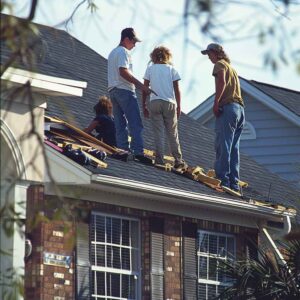Select roofing materials for corrosion-resistant coastal homes, durable in high winds, and UV-resistant. Consider aluminum, copper, or stainless steel for longevity. Metal roofs, like steel and aluminum, are ideal for wind and saltwater exposure. Choose tile options such as clay or concrete for durability and curb appeal. Synthetic materials like shakes or shingles offer low maintenance and aesthetic appeal. Proper installation and maintenance by roof contractors are crucial in coastal areas. Each material has unique benefits to protect your home against coastal elements.
Factors to Consider
When selecting roofing materials for coastal homes, various factors must be considered to ensure durability and longevity in challenging coastal conditions. One key aspect to remember is the high exposure to saltwater and salt-laden air in coastal areas. This exposure can lead to corrosion and deterioration of certain roofing materials over time. Opting for materials that are resistant to corrosion, such as aluminum, copper, or stainless steel, can help prolong the roof’s lifespan.
Furthermore, the strong winds commonly experienced in coastal regions require choosing roofing materials to withstand these forces. Materials like asphalt shingles, clay tiles, or metal roofs are known for their wind resistance properties, making them suitable for coastal homes. Ensuring proper installation and secure fastening of the roofing materials is also crucial to prevent damage during storms.
Additionally, the intense sunlight and UV radiation near the coast can cause materials to fade and deteriorate faster. Proper insulation and ventilation are important considerations to prevent heat buildup and moisture accumulation in coastal climates.
Metal Roofing Options
Considering the durability requirements for coastal homes, exploring metal roofing options is a vital choice that can withstand the challenging environmental conditions in such areas. Metal roofs are highly resistant to wind, rain, saltwater exposure, and UV rays, making them an ideal choice for coastal regions.
Several metal roofing materials are available, with steel, aluminum, and copper being the most common options.
Steel roofs are known for their strength and durability, making them suitable for areas prone to hurricanes and strong winds. Aluminum roofs are lightweight, corrosion-resistant, and an excellent choice for coastal homes because they withstand saltwater exposure without rusting. Copper roofs offer a distinctive appearance that develops a beautiful patina over time, adding a touch of elegance to coastal properties.
Metal roofs are also fire-resistant, environmentally friendly, and have a long lifespan, reducing the need for frequent replacements. Proper installation by experienced professionals is essential to guarantee the metal roof’s performance and longevity in coastal environments.
Tile Roofing Solutions
Exploring tile roofing solutions for coastal homes reveals a reliable and aesthetically pleasing option that can withstand the demanding conditions of coastal environments. Clay tiles, known for their durability and ability to enhance a home’s curb appeal, are popular. They are resistant to saltwater corrosion, strong winds, and heavy rains, making them ideal for coastal regions. Concrete tiles are another excellent option, offering benefits similar to clay tiles but at a lower price. Both clay and concrete tiles come in various shapes, colors, and styles, allowing homeowners to customize their roofs to suit their preferences.
One key advantage of tile roofing is its longevity.
When properly installed and maintained, tile roofs can last 50 years or more, providing a long-term roofing solution for coastal homes. Moreover, tiles offer natural insulation properties, helping to regulate indoor temperatures and potentially reduce energy costs. While tile roofing may have a higher upfront cost than other materials, its durability and aesthetic appeal make it a worthwhile investment for coastal homeowners seeking a reliable and attractive roofing solution.
Synthetic Roofing Materials
Moreover, synthetic roofing materials present a modern and versatile alternative for coastal homes, offering durability and aesthetic appeal while addressing specific environmental challenges. These materials, such as artificial slate, shake, or shingle options, are engineered to withstand harsh coastal conditions like high winds, saltwater exposure, and intense sunlight.
One significant advantage of synthetic roofing materials is their lightweight nature, which reduces the structural load on the house and makes installation easier. They are also highly resistant to mold, mildew, and insect damage, which are common issues in humid coastal environments. Moreover, synthetic materials often come with more extended warranties than traditional roofing materials, providing homeowners with peace of mind regarding their investment.
Furthermore, synthetic roofing materials can mimic the look of natural materials like slate or cedar shakes, enhancing the curb appeal of coastal homes without the maintenance requirements or costs associated with traditional options. When considering roofing options for coastal properties, synthetic materials stand out as a durable, low-maintenance, and aesthetically pleasing choice that can withstand the unique challenges of coastal living.
Other Roofing Tips:





